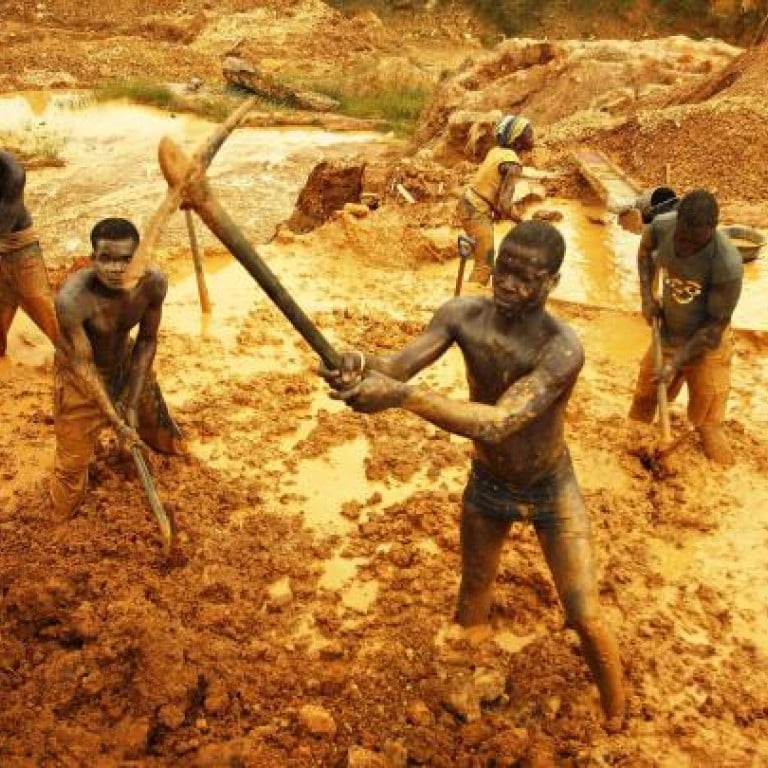
Influx of illegal Chinese gold miners creates tension in Ghana
Small mines in Ghana were intended for the country's poor, but an influx of Chinese are fighting their way in to dig for buried riches
Huang Renzhong's striped parasol stands out against the muddy cliff of excavated earth.
The horizon is fringed with the tall trees of the Ghanaian rainforest, but for Huang, this dilapidated shelter is his only shade from the sweltering tropical sun.
He and his other Chinese colleagues take turns to sit under it, overseeing the digging and churning of the murky water beneath them, where they are mining a huge pit for gold.
Two years ago Huang, 40, left his tea farm in Guangzhou to seek riches here in West Africa. Since then his work has been hot and arduous, and at times dangerous but, by his standards, the rewards are great.
Huang says he makes about 4,000 yuan (HK$5,000) per month. His salary, after deductions for living expenses, is paid straight to his family in China.
"The work is hard. [But] I came here to make money," said Huang. "In China I was average, or poor. To have the opportunity to travel abroad [and] make more money is fantastic."
Huang's mine is one of many illegal small-scale goldmines in Ghana - Africa's largest gold producer after South Africa. Ghana's Minerals Commission, which provides permits for lawful small-scale mining, has not authorised the site.
Foreigners are banned from working in Ghana's small-scale mining industry that was formalised in the 1980s to localise mining and bring much-needed income to the country's poor, rural communities .
Figures on the scale of illegal mining are non-existent, and Ghanaian authorities struggling to address the problem. But 23 per cent of Ghana's gold production is from small-scale mining, and some estimates calculate that 95 per cent in this category is illegal.
The authorities admit that the influx of Chinese miners and their wealthy backers is causing environmental destruction and social conflict on an unprecedented scale.
"The scale [of illegal mining in Ghana] is so vast it is difficult to actually quantify," said Brigadier General Daniel Mishio, chairman of Ghana's national security commission on lands and natural resources.
"It is a security threat … Apart from the threat posed by the weapons that [illegal miners] wield, we even also have issues of human security," Mishio added.
"In certain areas people don't even get clean drinking water and in some areas most of the forest cover has been destroyed," Mishio added. "This poses a very big danger to our future."
Mishio leads a taskforce that carries out raids on illegal mines. Last month 120 Chinese miners were arrested in a sting operation, one of a number in recent months .
Tensions in Ghana towards immigrants from China, Ghana's biggest trading partner, have led Ghana's president to reassure Chinese investors that the West African country remains keen to encourage economic co-operation. Both the Chinese and Ghanaian governments insist that there is no relation between the countries' bilateral agreements, including a recent US$3 billion China Development Bank loan to Ghana, and the activities of illegal Chinese immigrants.
But many blame Ghana's government for failing to prevent the destruction of large swaths of land for illegal mining.
"[This illegal mining] doesn't help us at all," said Kweku Gyaminah, 29, a witchdoctor in Manso Abodom, who makes over GBP1,000 a week (HK$11,800) from trading gold mined by villagers - many of them children - on the fringes of the Chinese-run mine operated by Huang and his colleagues. "Now all our drinking water is polluted, the farms [are] all gone and we haven't had any benefit from that."
Resentment towards the role of foreigners in mining in local communities is widespread, with frequent attacks by Ghanaians against increasingly heavily armed Chinese miners.
On the site where Huang and his colleagues work, the ground is littered with spent shotgun cartridges. "We have the guns to defend ourselves from the locals," said Huang.
Many of the guns owned by Chinese miners are said to come from the police, a practice which one senior officer said was indicative of the widespread corruption fuelled by the influx of foreigners.
